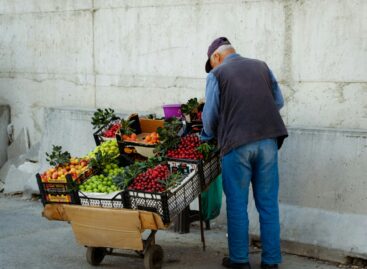A bit of Hungarian
Market research makes it evident that buying Hungarian is increasingly important for shoppers. The Ministry of Rural Development has already drawn up draft legislation on regulating Hungaricum and domestic products. Before Hungary’s accession to the European Union the proportion of domestic food products was high, for instance in 2003 it was 90 percent. Free trade entailed mass import and retailers started competing for buyers with cheap, lower-quality foreign products. As a result of privatisation, many prestigious Hungarian manufacturers with well-known and popular brands were acquired by large international companies. These companies often move production from one country to another. Hungary’s food safety law is Europe’s strictest but since we have been members of the EU this strict regulation mostly refers to products from third countries. Some Hungarian food products are in a favourable position: these received the protected designation of origin (PDO) or the protected geographical indication (PGI) marking from Brussels. The goal of the Ministry of Rural Development is to create a system where only those products can be marked ‘Hungarian’ that are guaranteed to be Hungarian. After a conciliation process the ministry sends the draft legislation to Brussels where a notification process will start. The regulation is expected to enter into force late summer/early autumn. It is high time as well because recently manufacturers started marking non-Hungarian products misleadingly. In the legislation we find the criteria for using the ‘100% Hungarian product’ marking – it can only be used on products made in Hungary from domestic base material and they can only contain foreign ingredients that cannot be produced in Hungary, e.g. tropical fruits, certain spices, etc. The law also regulates the usage of terms such as ‘Hungarian product’ and ‘Hungarian food product’ and the use of Hungary’s symbols or reminiscent graphic representations. Only those food enterprises fall under the scope of the legislation that operate in Hungary and it affects exclusively those who wish to indicate the origin of their products voluntarily. Consumer trust in food products is vital, so members of the Bonafarm Group pay highlighted attention to only displaying valid information on their products – Tamás Éder, the corporate relations and PR director of the company informed Trade magazin. József Rácz, managing director of Premium Fruit Kft. is of the opinion that the origin of a product can easily be determined if the tracking system works well. He added that import is necessary because consumers are now used to buying fresh fruits and vegetables in winter. Béla Fischer, president of the Sugary Industry Association reckons that in the case of sugar it is difficult to tell whether import is used during production. Zoltán Poór, president-CEO of Pannonmill Zrt. shares this opinion. In the milling industry the general practice is that base material for flour production is selected according to quality and not according to geographical origin.
Related news
Related news
How does the forint exchange rate affect consumer prices?
🎧 Hallgasd a cikket: Lejátszás Szünet Folytatás Leállítás Nyelv: Auto…
Read more >NGM: Hungarian micro and small enterprises can apply for site development under more flexible conditions
🎧 Hallgasd a cikket: Lejátszás Szünet Folytatás Leállítás Nyelv: Auto…
Read more >






